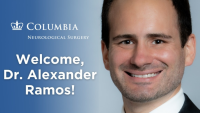Cerebrovascular Disease
Make an Appointment
Our team of dedicated access representatives is here to help you make an appointment with the specialists that you need.
Cerebrovascular diseases include many disorders of the brain’s blood vessels that impair cerebral circulation. The brain requires a significant portion of the body’s blood flow, and any reduction can result in stroke. Stroke is the fifth leading cause of death in the United States and is the leading cause of adult disability. At Columbia Neurosurgery’s Cerebrovascular Center, our physicians and surgeons are experts in the diagnosis and treatment of cerebrovascular diseases (also known as cerebral vascular diseases or neurovascular diseases), and in the prevention and treatment of ischemic and hemorrhagic stroke.
There are often several methods available to treat a cerebrovascular disorder, as well as a burgeoning array of new technologies. One important reason that Columbia has excellent outcomes treating patients with cerebrovascular diseases is our ability to navigate these options, taking into account each patient’s wishes and individual circumstances, making the right recommendation to treat each patient’s specific problem. Our expertise in the use of the latest surgical tools and technologies gives each patient the best chance to make a full recovery.
Common cerebrovascular diseases that we treat include:
- Cerebral aneurysms, both adult and pediatric
- Cerebrovascular malformation
- Arteriovenous malformation (AVM)
- Dural arteriovenous fistula
- Cavernous malformation (cavernous hemangioma)
- Venous malformation
- Carotid stenosis due to atherosclerotic disease
- Intracranial stenosis due to atherosclerotic disease (ICAD)
- Carotid or vertebral artery dissection due to fibromuscular dysplasia (FMD)
- Carotid artery disease, atherosclerosis, trauma and dissection
- Inflammatory diseases, vasculitis and mycotic aneurysm
- Acute ischemic stroke with large artery occlusion
- Acute hemorrhagic stroke due to subarachnoid hemorrhage (SAH), subdural hematoma (SDH) or intraparenchymal cerebral hemorrhage (IPH; ICH)
- Moyamoya syndrome
Treatment options for cerebrovascular disease include:
- Microsurgery for minimally invasive direct operation on the delicate cerebral blood vessels
- Endovascular neurosurgery for minimally invasive treatments from within the cerebral blood vessels
Common technologies include the following:
- Stenting, using a small metallic tube or mesh to widen narrowed arteries and improve blood flow
- Embolization, an umbrella term for endovascular procedures that block off an abnormality such as an aneurysm, arteriovenous malformation, fistula or tumor
- Clipping, sealing off an aneurysm with a clip
- Coiling, filling an aneurysm with small metal coils that cause the blood inside it to clot
- Flow diversion, implanting a high surface-area stent that directs blood flow away from an aneurysm
- Bypass surgery, rerouting the blood around an occlusion, tumor or damaged blood vessel
Our surgeons and interventional neuroradiologists are experts in these and other treatments.
Studies consistently show that, when it comes to treating cerebrovascular disease, experienced physicians at neuroscience centers of excellence and Comprehensive Stroke Centers (CSC) like Columbia University Irving Medical Center achieve the best possible patient outcomes. We are proud to offer that outstanding level of care at our Cerebrovascular Center.
Treatment options for cerebrovascular disorders have been advancing rapidly in recent years. The neurosurgeons and interventional radiologists at Columbia Neurosurgery are skilled and experienced with the most up-to-date versions of tried-and-true methods, as well as with the research and state-of-the-art technology that continue to advance the field.



